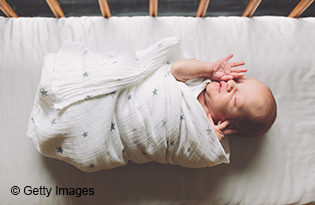Can home baby monitors prevent Sudden Infant Death Syndrome?
11/27/2023 by Noelle Torrance, M.D.

Picture this: You're in the hospital nursery with your newborn baby and your doctor starts talking about sudden infant death syndrome (SIDS) and safe sleep. You start looking into how you can prevent SIDS from happening to your child and find the Owlet, a sleep sock baby monitor to track heart rate and oxygen. Some sources say that the device prevents SIDS and others say it doesn't. What's the truth?
The truth is that home cardiorespiratory (heart and breathing) monitors (e.g., Owlet) do not reduce the risk of or prevent SIDS. Owlet is considered a wellness device by the Federal Drug Administration (FDA), which means that it is not intended for use to diagnose, cure, prevent or treat disease. And it isn't required to meet the same regulatory requirements as medical devices. The FDA released a warning letter on Oct. 5, 2021, to Owlet for marketing their products as "diagnostic" tools — which require a special clearance that Owlet didn't have — which led their Smart Sock to be pulled from the market. Since then, they have released other monitoring socks that are marketed as wellness devices.
Some families might wonder: Is it still okay to use the Owlet? The answer is that there is no absolute reason to avoid using the Owlet, but there are considerations to keep in mind. These products have been studied and found to have frequent false alarms (alarming that baby's oxygen or heart rates are low or abnormal when they are actually normal), which can lead to increased parental anxiety. There is also the concern that using these baby monitors may provide a false sense of security, leading families to not follow the other safe sleep recommendations. Not following these recommendations could potentially put the baby at an increased risk for SIDS.
Pediatricians recommend the following safe sleep guidelines as outlined by the American Academy of Pediatrics (AAP):
- Place infants on their backs, in their own sleep space, with no other people.
- Use a crib, bassinet or portable play yard with a firm, flat mattress and a fitted sheet. Avoid the baby sleeping on a couch, armchair or a seating device, like a swing or car safety seat (except while riding in the car).
- Keep loose blankets, pillows, stuffed toys, bumpers and other soft items out of the sleep space.
- Breastfeed if possible.
- Avoid smoking.
Owlet received FDA approval on June 16, 2023, for the not-yet-released BabySat monitor to be used for home monitoring of heart rate and oxygen in certain babies. The BabySat is only recommended to be used for babies between 1 and 18 months of age, weighing between 6 and 30 pounds, and under the direct supervision of a doctor who sets the alert ranges for each individual baby. This device will be an FDA-cleared medical device and is expected to be available with a prescription later this year. The BabySat may be used as an alternative to the previously used home monitors in infants with special healthcare needs (e.g., premature babies with apnea of prematurity or bronchopulmonary dysplasia or term babies with upper airway anomalies, central nervous system disorders, or neuromuscular disorders) or requiring home oxygen therapy. The BabySat is still not recommended as a device to prevent SIDS, as no home monitoring system has been found to prevent SIDS.
What does this mean for your baby? If your baby is otherwise healthy and your doctor hasn't recommended home heart and oxygen monitoring, they don't need a home monitoring device. Pediatricians recommend following the safe sleep recommendations from the AAP and reaching out to your primary care clinician with any questions.
Noelle Torrance, M.D., is a third-year resident in Pediatric and Adolescent Medicine at Mayo Clinic in Rochester, Minnesota. Following residency, she plans to practice as a primary care pediatrician.
